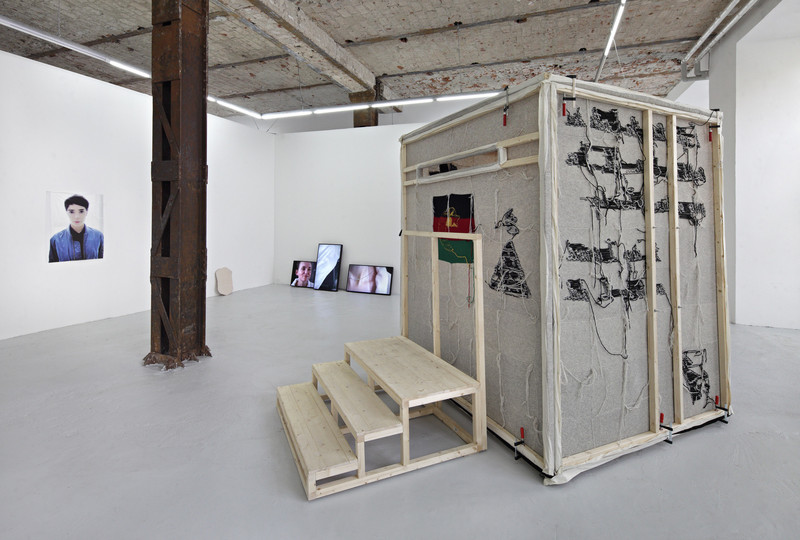Momentum?
18 Jan - 28 Feb 2014
MOMENTUM? MAYBE THE TIME HAS COME TO LIVE OUR CORPORALITY RATHER THAN SPEAK OUR SEXUALITY
Marie Angeletti, Kjersti Andvig, Sylvie Blocher, Caroline Mesquita, Marina Faust, Pilvi Takala, Tania Perez Cordova, Tobias Kaspar, Hannah Weinberger
18 January - 28 February 2014
Curated by Petunia, the art and entertainment magazine
„Maybe it is time we live our corporality rather than speak our sexuality.“ This sentence appeared in the 1973 issue of Recherches, entitled Three Billions of Perverts. The Great Encyclopedia of Homosexuality, which was seized for affronting public decency. Guy Hocquenghem, the author of one of the included essays, warned the reader that it was “exclusively addressed to the ones with whom he couldn’t make love. For everyone else, the festivity of bodies transforms speech into a servant of the body, nothing else”. In it, Hocquenghem, a member of the Front homosexuel d’action révolutionnaire exposed the contradictions inherent to this group, his virulent critique of sexual institutions and assignations, his hopes to see the revolution impulse extend to all areas of life.
“Festivity of bodies”, outrage to “public decency”, rejection of existing structures, and a provocatively direct address to the audience: the elements of this story are symptomatic of a moment when things could unleash and culminate, when individuals would converge in order to create a completely new situation: a revolution, even a small one. This convergence – not to be confused with a consensus – can also be called a Momentum.
What about a second-hand momentum, making use of words and sentences from a past momentum? What about a momentum with inner conflicts and contradictions much deeper than the ones of the 70s era? What if this violent absence of consensus was to make for a perfect momentum? What about a momentum aggregating a community of oblique positions and gazes, a group of individuals all looking aside in directions so different it might map an erratic ideological landscape? What if this landscape would nevertheless, by some kind of chance, enable a new situation?
What if the artists and the works in this show were in a state of expectancy, aspiring for a momentum that might never be? Could a small feminist publication make them believe it will ultimately happen and ask them to hold their breath until it does?
Waiting for someone to get into contact (Tania Perez Cordova), knitting and counting the dead (Kjersti G. Andvig), shopping (Pilvi Takala), taking care of one’s skin (Tobias Kaspar), singing seemingly utopian political speeches (Sylvie Blocher), producing music or sound in order to get the audience’s attention (Caroline Mesquita, Hannah Weinberger, Marie Angeletti) or simply staring at it (Marina Faust) : the works in the show are literal in their conception and their formal aspects. They straight-forwardly question the limits of our bodies, whether intimate, social, or political. Charged with passive aggressiveness the works invoke a specific Momentum – past, imaginary, or to come. They don’t want to depend on subtext in order to be understood: Indeed they are mute, even when they sing.
Marie Angeletti, Kjersti Andvig, Sylvie Blocher, Caroline Mesquita, Marina Faust, Pilvi Takala, Tania Perez Cordova, Tobias Kaspar, Hannah Weinberger
18 January - 28 February 2014
Curated by Petunia, the art and entertainment magazine
„Maybe it is time we live our corporality rather than speak our sexuality.“ This sentence appeared in the 1973 issue of Recherches, entitled Three Billions of Perverts. The Great Encyclopedia of Homosexuality, which was seized for affronting public decency. Guy Hocquenghem, the author of one of the included essays, warned the reader that it was “exclusively addressed to the ones with whom he couldn’t make love. For everyone else, the festivity of bodies transforms speech into a servant of the body, nothing else”. In it, Hocquenghem, a member of the Front homosexuel d’action révolutionnaire exposed the contradictions inherent to this group, his virulent critique of sexual institutions and assignations, his hopes to see the revolution impulse extend to all areas of life.
“Festivity of bodies”, outrage to “public decency”, rejection of existing structures, and a provocatively direct address to the audience: the elements of this story are symptomatic of a moment when things could unleash and culminate, when individuals would converge in order to create a completely new situation: a revolution, even a small one. This convergence – not to be confused with a consensus – can also be called a Momentum.
What about a second-hand momentum, making use of words and sentences from a past momentum? What about a momentum with inner conflicts and contradictions much deeper than the ones of the 70s era? What if this violent absence of consensus was to make for a perfect momentum? What about a momentum aggregating a community of oblique positions and gazes, a group of individuals all looking aside in directions so different it might map an erratic ideological landscape? What if this landscape would nevertheless, by some kind of chance, enable a new situation?
What if the artists and the works in this show were in a state of expectancy, aspiring for a momentum that might never be? Could a small feminist publication make them believe it will ultimately happen and ask them to hold their breath until it does?
Waiting for someone to get into contact (Tania Perez Cordova), knitting and counting the dead (Kjersti G. Andvig), shopping (Pilvi Takala), taking care of one’s skin (Tobias Kaspar), singing seemingly utopian political speeches (Sylvie Blocher), producing music or sound in order to get the audience’s attention (Caroline Mesquita, Hannah Weinberger, Marie Angeletti) or simply staring at it (Marina Faust) : the works in the show are literal in their conception and their formal aspects. They straight-forwardly question the limits of our bodies, whether intimate, social, or political. Charged with passive aggressiveness the works invoke a specific Momentum – past, imaginary, or to come. They don’t want to depend on subtext in order to be understood: Indeed they are mute, even when they sing.

